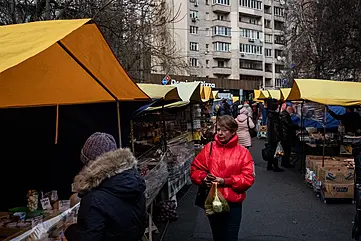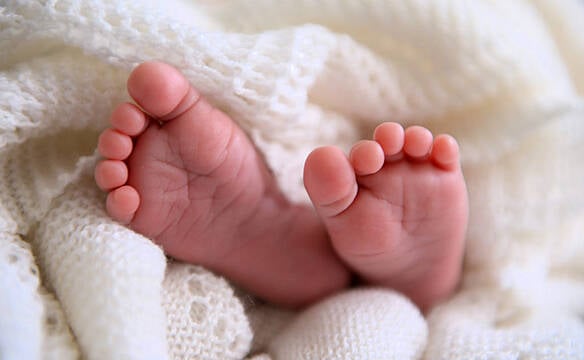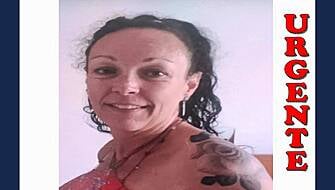A spokeswoman for Irish Families Through Surrogacy (IFTS) has said that the reality is Irish couples will continue to travel to Ukraine to be with their babies, despite the volatile situation in the country.
While the group supports and works closely with the Department of Foreign Affairs, who have advised against travel to the country due to the Russian military build up on its border, it is also looking at the "human side" of the situation.
IFTS spokeswoman Catherine Wheatley told BreakingNews.ie: "The reality of the situation is, every single parent is going to try to get there. We absolutely support the Department of Foreign Affairs and the advice they have to give out to try to protect Irish citizens, but when you think about it these babies they are going to finally meet after a long and arduous journey, these babies are Irish citizens, so every parent is going to try to get to them if they can at all and while they can.
Any parent would move mountains to get to their child
"There were some babies born today in Ukraine, others are due tomorrow, so we have couples that are absolutely travelling to Ukraine currently and will continue to travel as long as they can in that regard. Obviously if the situation changes they will have to re-evaluate.
"We try to balance the advice with the human element, but the truth is any parent would move mountains to get to their child, and that’s all these parents are doing, they will do anything they can."
Ms Wheatley explained that couples who pursue surrogacy in the Ukraine all need to have a medical reason for doing so, and "have all been through very dark days and a lot of adversity so at this point they just want to be there with their child".
She added: "If they can get there, they will. As an organisation, we’re calling on the Department of Foreign Affairs to put in some temporary measures to speed the process up in order to get the families home to safety."
Ms Wheatley, who is the mother of twins born through surrogacy in Ukraine, was full of praise for the Department and the work it does with couples involved in surrogacy in the Ukraine.
"I have to say, the Department of Foreign Affairs has been brilliant. Our Department has been fantastic, they have engaged, and it’s brilliant to be able to say that."
"How the normal process works, you go to Ukraine, your baby is born, the two parents register the birth of the child. In the Ukraine I’m registered as being my twins’ mother, and I’m on the birth cert along with my husband. After that, you get a DNA test of the father to show the genetic relationship. Because of Irish law, the mother is the person who gives birth, so even though I’m on the birth certificate in the Ukraine, under Irish law that’s not recognised," she explained.
"The father gets the DNA test and once that’s back, and there’s a genetic link, that child becomes an Irish citizen, and should be afforded all the provisions and protection of being an Irish citizen."
While there were stories of babies born through surrogacy stranded in Ukraine in the early stages of the pandemic, Ms Wheatley said none of these were Irish babies.
Support
"The Department of Foreign Affairs got those couples out to their children and got them home again. That’s amazing, and I’m so proud of our Government for that, that they give such levels of support to couples."
Hundreds of Irish couples, many supported by IFTS, go down the route of surrogacy and Ms Wheatley said a number of unfair perceptions around the process have been unhelpful for people.
"We’ve been asked insensitive questions like, are we going to bring surrogates to Ireland; that’s crazy. Surrogates are individual people who have made the choice to be a surrogate and to carry a baby to help families, they have their own families, lives, jobs, a whole community of people, you can’t just say ‘come on over here’, it’s ridiculous to even suggest that.
"Sometimes we’re portrayed as couples who don’t care as long as we get our baby, that couldn’t be further from the truth. Couples are not just worried about their own children, the babies surrogates are carrying, they’re worried about their surrogates and their families if war breaks out."
Ms Wheatley has maintained a close relationship with Ivana, the surrogate who carried her twins, and they speak regularly.
While the stories of tanks and soldiers looming over Ukraine may reflect a picture of a country in crisis, Ms Wheatley explained that this is not the case.
"I speak to Ivana regularly, I just had a Zoom call with her last night. Life is still going ahead as normal there, her own baby is being christened next Sunday, and they’re having a big party for it and all the preparations are in place, on the ground in the Ukraine life is absolutely normal.
"Every pregnancy is fraught with worry and anxiety and when you hear reports about impending war and military operations, you paint a picture of something that would scare the living daylights out of any parent.
"But we are regularly in contact with the surrogates, clinics, solicitors in the Ukraine, the people on the ground, and we can tell these couples about what life is actually like there at the moment, and it’s completely normal. There’s no stockpiling, panic, or anything.
"She thinks we’re all crazy, she told me everything is fine. It’s a huge relief to the couples waiting to travel over."
She said this is a big comfort to couples who are preparing to travel to Ukraine.
Meanwhile, the group is working with clinics to help surrogates who wish to leave Kyiv due to the uncertainty to give birth in the city of Lviv, which is close to the Polish border.

"One of the things that we in Irish Families Through Surrogacy are doing is we’re trying to work with the clinics to give the surrogate mother options in terms of what they want to do, if they feel they don’t want to be in Kyiv because a lot of the conflict if it happens could be around there, we’re urging clinics to put contingency plans in place to accommodate them further west towards the Polish border in the city of Lviv."
Ms Wheatley praised Fine Gael Senator Mary Seery-Kearney, who is an advocate for couples involved in international surrogacy and has worked as a liaison between IFTS and Government.
"She has been in direct contact with the couples involved, and to have her involved is an unbelievable comfort to them and has been a huge support in liaising with us and the Department of Foreign Affairs.
"We also have amazing solicitors working with us who are leaving no stones unturned to make sure all the paperwork is in place. There are also plans to move the DNA testing from Kyiv to Lviv, if anything happens, everyone is pulling together to do whatever they can."
An upcoming Oireachtas committee will consider the regulation of international surrogacy, and Ms Wheatley said this is important for parents who already have children born through surrogacy and others who are starting out on their journey.
"If there is regulation in place, it protects surrogates, parents and most importantly the children. We see surrogacy as a medical treatment, couples should feel absolutely comfortable in availing of it.
"I want my children to grow up in an Ireland that says ‘this is amazing, and look at what your parents went through to have you’.
"Ireland has come so far as a country, but this is an area we can’t shy away from we need to look at assisted human reproduction and keep up with the times."







